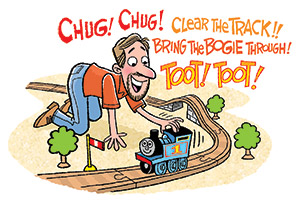You will notice that the name of this article is not “People That Talk.” Talking people is to be expected. What tends to catch folks off guard is when vegetables and other inanimate objects start speaking.
Now, I have nothing against tomatoes that teach Bible principles or cucumbers that sing silly songs. But you have to admit, it doesn’t happen all that often in the average garden.
Computers talk to us quite a bit these days. It used to be that a nice, friendly person would call from my doctor’s office to remind me of an upcoming appointment. Now a computer calls Randy Fishell’s home and attempts to convince him that it cares personally and deeply about his health: “This is Mid-Atlantic Medical calling to remind [pause] RON-DEE FIZZ-HEEL [pause] of your appointment on Monday, October 6 at 1:00 p.m.” If you or I talked like that, we’d be in speech therapy next week.
Several years ago I was introduced by my children to a talking train named Thomas the Tank Engine. In these books and videos Thomas and a host of other train cars do a lot of chatting. Back then the little wooden train cars themselves didn’t speak, although today’s versions probably have onboard digital chips that allow them to carry on lengthy conversations with each other.
Here’s a classic example of their trainyard banter:
Gordon: You, Thomas, are small. Small! Small! Small! But I . . . I’m a big blue engine who knows everything.
Thomas: Bossy Sprockets! All that steam has gone through your funnel.
Splatter: Hey! Hey! Just watch what happens to that blue puffball . . .
Dodge: When Harold the flopper chopper flies past here.
Splatter: Right!
Harold [flying]: Routine flyby, chaps. Hello!
Splatter: The Boss dumped sneezing powder everywhere.
Dodge: Let’s start laughing now!
Through the years I have purchased, read aloud, and watched many hours worth of Thomas the Tank Engine media. To date, I have understood very little of it.
Maybe it would help if I learned something about the series’ author, Reverand W. Awdry, I thought. So I came up with a few questions to ask him.
Question 1: Why are you embarrassed to share your first name? What does that “W” stand for—‘Weird,’ perhaps?
Question 2: Where does a pastor find time to write books about talking trains?
Question 3: Did your parents force you to attend Bible college when you really wanted to be a train conductor when you grew up?
Unfortunately author Awdry died in 1997, so he is currently unavailable to take my call. The question remains: Why do I have such a hard time understanding what’s going on?
Frankly, I think it’s because I know virtually nothing about old-school English railway jargon. What does a “fitter” do? Is a “bogie” alive? Who regulates the “regulator, ” and why?
Truth be told, if I really wanted to understand what Awdry had in mind when he wrote the series, I could find plenty of information. Learning about his background, the purpose behind Thomas the Tank Engine, and what various words mean would make a big difference in understanding what’s going on.
Some people reject the Bible because they just can’t figure it out. They ask questions such as “Why would a loving God kill people?” “How come He didn’t answer my prayer?” “Why did Jesus have to die?”
A good way to find answers to tough Bible questions is to study up on its background, Author, and the words that are being used. As you do this, more and more pieces of the spiritual puzzle will fall into place for you. And don’t forget to ask for the Holy Spirit to keep you on track as you explore God’s Word.
Believe it or not, I still enjoy creating a wide range of train routes from the astonishingly expensive Thomas the Tank Engine wooden track pieces. It is undoubtedly a fascinating sight to see a grown man pushing toy train cars around the mythical island of Sodor. But I have no time for that just now. I’m off to see if those talking vegetables end up getting cooked in a big fiery furnace.


